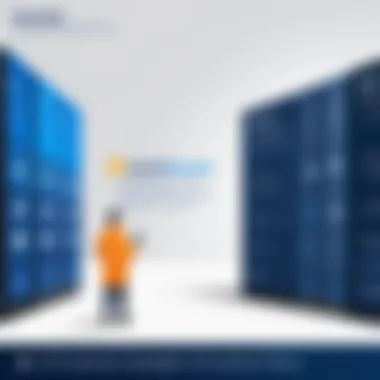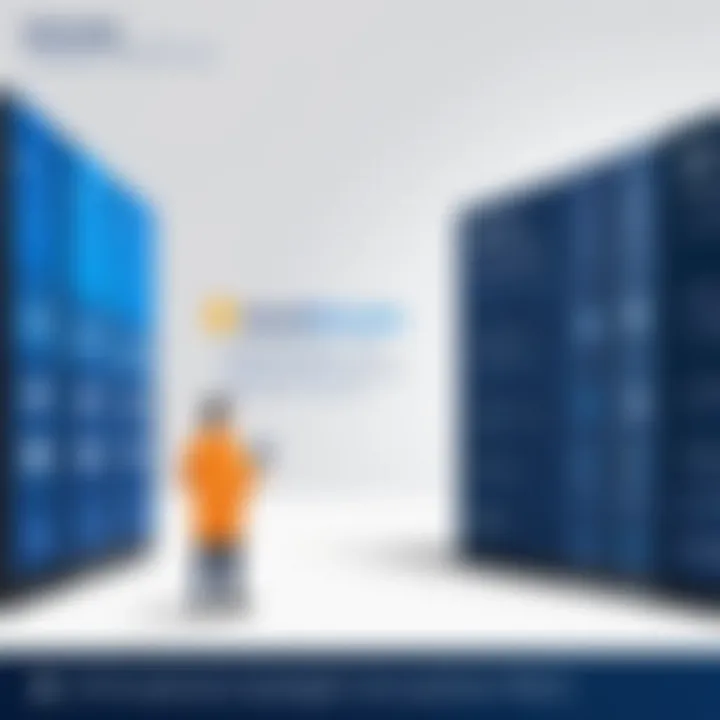Essential Considerations for Buying Acronis Software


Intro
Deciding to invest in Acronis software is more than just a simple shopping spree; it's a journey that can significantly impact your organization's data management and protection strategies. As data has become the lifeblood of modern enterprises, choosing the right tools to safeguard that data is crucial. Acronis provides robust solutions, catering to various needs, from personal use to large-scale enterprise solutions. However, before diving into a purchase, potential buyers should carefully consider several factors.
This guide aims to shed light on key features, pricing models, and the overall value proposition of Acronis software. By providing a roadmap, we aim to equip decision-makers with the necessary insights to navigate this pivotal moment in their buying journey.
Importance of Making an Informed Decision
Making an informed decision not only saves money but also ensures alignment with business goals. Software that doesn’t meet the specific requirements can lead to wasted resources and missed opportunities. Thus, understanding Acronis — its offerings, market position, and differentiators — can bolster your confidence as you embark on this acquisition journey.
In the following sections, we’ll explore the core features of Acronis software, take a closer look at various pricing plans, and synthesize this information to guide you in choosing the best option for your needs.
Understanding Acronis
Acronis stands as a significant player in the realm of data protection and management solutions. To grasp the full scope of its offerings, one must first delve into the intricate web of services and products it provides. This understanding is pivotal as the right choice can determine the efficacy of data backup, recovery, and overall cyber protection. In today's climate of increasing data breaches and system failures, knowing what Acronis brings to the table can be a game-changer for businesses and individuals alike.
Overview of Acronis Solutions
Acronis is not just a single product but an array of robust solutions tailored to meet various needs. Its primary offerings include Acronis Backup, Acronis Cyber Protect, and Acronis True Image. Each solution serves a distinct purpose, ultimately aiming to safeguard critical data and ensure business continuity.
Acronis Backup provides a comprehensive backup and recovery service, allowing users to recover their systems and files in case of data loss. On the other hand, Acronis Cyber Protect combines backup with advanced cybersecurity measures, making it particularly appealing in today’s vicious cyber climate. Lastly, Acronis True Image is designed for personal users, enabling individual file and system backup.
The versatility in these solutions means that consumers, whether they are corporate giants or everyday users, can find a fitting solution that addresses their unique needs. Understanding these categories sets the groundwork for evaluating which solution aligns best with one’s requirements.
Key Features and Capabilities
When sifting through Acronis offerings, several key features leap out, embodying what makes the solutions worthwhile. Here are a few standout capabilities:
- Unified Data Protection: Acronis provides a unique blend of data backup and cybersecurity features, ensuring that data is not only backed up but also protected from various threats.
- Cloud Storage Options: With the flexibility of cloud storage, users can access their data from anywhere, enhancing mobility and convenience.
- Instant Restore Features: This allows for immediate recovery of data, minimizing downtime in case of an issue.
- AI-based Ransomware Protection: Acronis integrates advanced AI technologies to detect and thwart ransomware attacks in real-time, which is vital in today's landscape of frequent cyber threats.
These features do not just enhance user experience; they reframe the very approach to data management, offering peace of mind in an unpredictable digital environment.
Target Audience and Use Cases
Selecting Acronis often boils down to understanding who stands to benefit the most from its solutions. The target audience is broad, covering:
- Small to Medium-sized Enterprises: For these organizations, budget constraints and the need for comprehensive solutions without the need for extensive IT support make Acronis an attractive choice.
- Large Corporations: They usually require advanced data protection measures alongside strict compliance requirements, a realm where Acronis excels.
- Personal Users: Increasingly, individuals are turning to Acronis True Image for personal data safety, particularly those with extensive digital assets.
Here are some typical use cases:
- Data Recovery After a Ransomware Attack: Businesses can swiftly revert to a secure data state without significant losses.
- Backup for Remote Workers: With the rise of remote work, many companies rely on Acronis to maintain data security for employees working from various locations.
- Personal Photo and File Storage: Individuals looking to protect their treasured memories while preventing accidental loss find Acronis to be an asset.
Understanding these aspects of Acronis not only clarifies its applications but also ensures that prospective customers make decisions based on a well-informed foundation.
The Importance of Evaluating Software Purchase
When it comes to investing in software like Acronis, taking a moment to step back and think through your purchase can make all the difference. It's not just a matter of picking a software solution and hoping it works out; you reap the rewards from a focused evaluation process. This article emphasizes why evaluating software purchases is crucial and outlines the key components that guide you through this often complex landscape.
Defining Business Requirements
First and foremost, understanding your business requirements sets the stage for everything else. You need to ask, "What exactly do we need this software to accomplish?" Getting clear about priorities like data backup, cybersecurity, or file sharing will help narrow down choices. It's akin to finding a needle in a haystack; if you don't sift through the hay (or potential software options), you're likely to miss out on the one that fits just right.
Consider involving stakeholders from various departments. Their insights can shed light on needs you might overlook. After all, what good is a top-notch backup solution if it doesn’t mesh well with your existing virtual ecosystem? Collaborating and gathering input ensures that everyone’s voice is heard and that you’re not investing in features nobody will ultimately use.
Market Research and Comparison
With requirements clarified, diving into market research becomes imperative. Don't just look at Acronis alone; scope out its competitors too. It's useful to utilize side-by-side comparisons to glean insights into features and pricing structures. Sometimes, they say “you don’t know what you’re missing,” and that rings especially true when you compare multiple solutions.
Think about it as going shopping for a car. You wouldn't just buy the first one you see without checking other models. Explore alternatives, read customer reviews on platforms like Reddit, or even visit forums to catch buzz around the latest software trends. Online resources such as Wikipedia, or Britannica can expand your understanding of the market landscape. The goal here is to collect good information that leads you to the right choice for your unique environment.


Understanding Total Cost of Ownership
An element that's frequently brushed aside is the total cost of ownership (TCO). It’s essential to look beyond the initial price tag on Acronis software. Do you know about ongoing costs like maintenance fees, updates, and potential add-ons? This is where many organizations trip up. By being aware of TCO, you ward off unpleasant surprises down the line.
Here are some factors to consider when calculating TCO:
- Licensing fees: Are they one-time, subscription-based, or tiered? What fits your budget?
- Training costs: Will your team require specialized training to maximize efficiency?
- Hidden costs: Think about costs related to implementation, integration, and future scaling.
Ultimately, calculating TCO provides a clearer picture of how much your software solution will cost over time, making you a more informed buyer.
"A stitch in time saves nine"—investing effort into evaluating all these factors not only saves you cash down the road but also paves the way for a smoother operational experience.
Engaging in a thoughtful evaluation process is the keystone of making a wise software purchase. Aligning business requirements with careful market research and a comprehensive understanding of costs leads you down the path of success. The time and effort spent now will yield benefits that help you navigate your acquisition journey with assurance.
Evaluating Acronis Options
When considering a software like Acronis, one has to take a long, hard look at the evaluation process of its different options. This is not just about picking the first shiny tool that catches your eye; it’s about understanding the various suites of services Acronis provides and how they fit into your specific business landscape. The importance of this evaluation lies in ensuring that you invest in a solution that genuinely meets your needs, aligns with your technology stack, and supports your long-term objectives.
The Acronis Backup Solutions, for example, prowess in data protection is undeniable. But how effective are they for your disaster recovery plans? Is it easily integrated with existing solutions? How quickly can you restore your systems when the unthinkable happens?
Similarly, the Acronis Cyber Protection Solutions juggle a lot of responsibilities, from data security to management and backup. They provide a comprehensive suite that essentially combines multiple layers of protection into one seamless interface. Still, do all these features resonate with your operational requirements?
Last but not least, take note of the Acronis File Sync and Share Services. The convenience these services bring for remote collaboration can be a game-changer, yet you need to evaluate whether their implementations mesh well with your workflow processes.
Evaluating Acronis options is foundational in making an informed choice that will steer your organization toward efficiency and safeguarding your assets.
Acronis Backup Solutions
The Acronis Backup Solutions offer extensive data protection features. They are engineered for various environments, from physical servers to virtual machines and cloud services. One of the standout attributes of Acronis is the universal restore capability, allowing users to recover any system to new hardware or virtual environments. This flexibility can be a lifesaver in disaster recovery situations, enabling businesses to bounce back without missing a beat.
Moreover, the solution supports both incremental and full backups, ensuring you can restore not just the saved files but also the complete system state. Here are some benefits worth noting:
- Ease of use: The interface is user-friendly, allowing even the less technically savvy to navigate without a hitch.
- Automated scheduling: Set it and forget it; the system runs on your timeline, reducing manual input.
- Granular recovery options: Select specific files or entire disks to restore, minimizing downtime.
Overall, Acronis Backup Solutions equip organizations to have peace of mind regarding data recovery, laying a solid groundwork for operational integrity.
Acronis Cyber Protection Solutions
In today’s digital landscape, cybersecurity cannot be an afterthought. Acronis Cyber Protection Solutions combine backup, disaster recovery, and active cybersecurity measures into a single platform. This convergence creates a fortified posture against data loss, ransomware, and other cyber threats.
The centralized management approach simplifies not just security management, but it also streamlines tech support and monitoring. Think of this as having a Swiss Army knife at your disposal – all necessary tools are present and kept tidy in one place. Here are some features worth highlighting:
- AI-based ransomware protection: The solutions utilize advanced algorithms to detect anomalies, thus preemptively blocking ransomware attacks.
- Blockchain-based authenticity: Acronis records any changes to files in a manner similar to a digital ledger, making it easier to verify integrity.
- Flexible deployment options: Whether you’re on-premises, in the cloud, or a mix of both, the solutions adapt seamlessly.
Ultimately, these solutions are about empowering businesses to not just react but proactively guard against threats, ensuring that organizations can confidently operate even in uncertain environments.
Acronis File Sync and Share Services
As remote work gains traction, the need for effective file-sharing solutions has never been clearer. Acronis File Sync and Share Services provide a platform that allows users to collaborate, share, and sync files effortlessly across devices. But it’s not just about sharing documents—the service prioritizes security and compliance.
Considering the proliferation of sensitive data being transmitted, you want assurance that your files are not falling into the wrong hands. Acronis addresses these concerns with features like:
- Data encryption: Both at rest and in transit, ensuring heightened security standards.
- Compliance with regulations: Tools to help organizations meet GDPR, HIPAA, and other regulatory requirements.
- Version control: Allows users to track changes and revert to older versions if necessary, preventing chaos during collaborative projects.
Acronis' approach to file sync and share services resonates with the trend of modern workplaces, where data mobility and secure collaboration are paramount.
In summary, the process of evaluating options within Acronis is crucial. Each service suite offers unique features that cater to different business needs. Whether you prioritize backup reliability, cyber protection capabilities, or file sharing and collaboration, understanding these distinct offerings can significantly improve your decision-making process.
Pricing Structure of Acronis


Understanding the pricing structure of Acronis is pivotal for businesses considering making a purchase. When you’re investing in software that is central to your operational integrity, it’s only natural to ponder how much bang you’re getting for your buck. This section will dissect the pricing nuances, offering clarity on cost implications and helping you weigh the potential return on investment.
Subscription vs. One-Time Purchase
The debate between subscription models and one-time purchases is a classic conundrum in the software world. With Acronis, there's flexibility, but that also comes with some vital factors to mull over.
Subscription models typically spread the payment out over time. This can ease budget constraints, especially for small to medium-sized enterprises. Companies can enjoy consistent updates and customer support as long as their subscription is active. However, the recurring payments might add up over time, leading some to question if it’s truly the more economical choice in the long run.
On the flip side, one-time purchases demand a heftier initial payment but may prove less costly over an extended period. Users own the software outright, which could be beneficial for businesses with stable needs that don’t necessitate constant updates and support. However, this path does come with its pitfalls; additional costs may arise for upgrades or support, which can be a nasty surprise down the road.
Available Discount and Promotions
Acronis routinely rolls out discounts and promotions that can make their software more tantalizingly accessible. It’s important to stay on the lookout for these deals, as they can significantly impact the total cost.
- Seasonal Offers: Certain times of year, like Black Friday or back-to-school season, may bring substantial discounts on software licenses.
- Bulk Purchase Discounts: If your organization is looking to buy multiple licenses, negotiating for bulk pricing is advisable. Acronis may have special pricing tiers for educational institutions or non-profits.
- Loyalty Programs: Existing customers might find loyalty discounts advantageous. Upgrading or renewing can result in lower rates if you’ve been a long-time user.
It's wise to examine any potential bundled services that could offer further savings when purchasing solutions like Acronis Cyber Protect alongside backup options.
Understanding Licensing Models
When considering Acronis products, it’s crucial to grasp the various licensing models that may dictate usage rights and restrictions. A clear understanding here can save a lot of headaches in the future.
- Perpetual Licenses: This model allows users to use the software indefinitely after a one-time purchase. However, access to future updates often requires additional fees.
- Subscription Licenses: As previously discussed, these require ongoing fees. It's essential to note the renewal terms—some might renew automatically, leading to unexpected charges if not monitored closely.
- User-based vs. Device-based Licensing: Acronis offers different licensing based on whether it’s per user or per device. Assess which model aligns with your organization’s needs. A user-based license might benefit a workforce that uses multiple devices, while a device-based option may fit organizations with fixed hardware.
In summary, purchasing Acronis software is not as straightforward as simply paying a fee; it’s a labyrinth of options and considerations. Each path has its pros and cons that must align with your organization's goals, budget, and technology strategy.
"Choosing the right payment structure is not just about price; it’s about value—what does that number truly bring to your organization in terms of peace of mind and efficiency?"
By weighing these factors thoughtfully, businesses can make informed decisions that best suit their needs.
Integrating Acronis with Existing Systems
Integrating Acronis solutions with existing systems is more than just a tech chore; it's about weaving a cohesive fabric of data protection and efficiency that aligns with your current infrastructure. This integration ensures that businesses can leverage Acronis' robust capabilities while enjoying continuity and minimizing disruption.
A well-implemented integration strategy can lead to significant benefits such as enhanced efficiency, reduced operational risks, and improved confidence in data security. The decision-makers and IT professionals must recognize the immediate and long-term implications of their integration choices.
Compatibility and Integration Considerations
When we chat about compatibility, it’s a bit like finding the right partner; not every solution will mesh well with what you've already got in place. Acronis aims to play nicely with numerous platforms and systems, but understanding how it fits into your existing ecosystem is critical.
- System Requirements: Before bringing Acronis onboard, assess your current systems. Are they up to the task? A detailed review of hardware and software specifications ensures a smoother integration.
- APIs and Connectors: Acronis offers various APIs and connectors that facilitate integration with other tools and platforms. Familiarize yourself with these to ensure the solutions you are integrating work well together.
- Performance Impact: It's imperative to consider how Acronis may impact your system’s performance. Will it slow down processes? Or can it enhance overall efficiency? Conducting tests in a controlled environment can help illuminate these concerns.
- Customization Needs: Every business is unique. You may need to develop some custom solutions or configure settings in Acronis for effective integration. This step should not be taken lightly, as it could require additional resources and time.
"Integrating new technology with old systems can feel like fitting a square peg into a round hole, but the right approach can make it a perfect match."
By considering these factors, you can make informed decisions and seamlessly connect Acronis with what you already have up and running.
Migration Strategies for Existing Data
Every time a new solution is introduced, migrating existing data can be a significant sticking point. This part of integration can be daunting, but with the right strategies in hand, the transition can be smooth sailing. Here are some pathways to ponder:
- Data Assessment: Start by understanding what data you have. Not all data is created equal; some will be crucial, while other bits may be junk. Catalog your data to simplify the migration process.
- Establishing a Migration Plan: Create a step-by-step plan that outlines what data will be moved, when, and how. This might even involve off-peak hours to avoid disruptions.
- Backup Data: Make sure to backup your data before starting the migration process. It’s the safety net that prevents loss, should something go sideways during the transfer. Acronis has tools designed specifically for this purpose.
- Testing After Migration: Once you've completed the migration, conducting a post-migration audit is essential. Check for data integrity and accessibility to confirm everything was transferred correctly.
- User Training: Ensure your team is well-versed in working with Acronis and accessing migrated data. Training can bridge understanding gaps and lead to more effective usage of the new system.
Integrating Acronis with your existing systems could feel like steering a ship through choppy waters, but with the right insights and preparation, it's entirely navigable.
Assessing Security and Compliance
When diving into software purchases, especially in the realm of data management and protection, assessing security and compliance cannot be an afterthought. For Acronis, a leader in the field, the stakes are particularly high. Businesses often handle sensitive information—from credit card numbers to personal data—and any breach can lead to devastating consequences. Thus, a thorough evaluation of these aspects ensures the organization is safeguarded against threats and adheres to necessary legal frameworks.
Data Protection Measures in Acronis


Acronis employs a multifaceted approach to data protection, utilizing advanced technologies that assure users their information is in safe hands. Some of the primary measures include:
- End-to-End Encryption: Acronis prioritizes data privacy by maintaining encryption from the point of capture through to storage, meaning unauthorized access is significantly minimized.
- Ransomware Protection: Given the ever-evolving landscape of cyber threats, Acronis incorporates real-time protection to detect and neutralize ransomware attacks, often before they can wreak havoc.
- Immutable Backups: This feature ensures backups cannot be altered or deleted until a set retention period has completed, serving as a safety net against accidental or malicious changes.
These measures empower businesses to fortify their digital presence and maintain customer trust. However, employing them is not a one-size-fits-all exercise. Companies must analyze their specific needs—nature of their data, existing infrastructure, and potential threats—before making a choice.
"In a world where data is as valuable as gold, robust security is no longer a luxury; it’s a necessity."
Regulatory Compliance Considerations
Following the introduction of stringent regulations such as GDPR in the EU and HIPAA in the US, compliance is a significant driver in choosing any software solution. Engaging with Acronis can streamline this process. Here’s how:
- Data Sovereignty: Acronis offers solutions that respect local data laws, allowing businesses to choose where their data is stored. For international operations, this flexibility helps in navigating various legal landscapes.
- Audit Trails: Integration with Acronis provides tracking mechanisms that record user activity and data access. This feature is invaluable during audits and can substantially ease compliance worries.
- Regular Updates: As regulations evolve, Acronis is committed to keeping its software updated to align with changing legal requirements. This ensures businesses remain compliant without needing constant manual oversight.
While employing Acronis’s solutions, it's crucial for organizations to continuously engage with compliance experts. Developing an in-depth understanding of applicable regulations is central to maintaining operational integrity and avoiding hefty fines. Security and compliance are two inseparable sides of the same coin in today’s data-driven world.
Customer Support and Resources
When it comes to utilizing Acronis' software, the role of customer support and available resources cannot be overstated. Having a dependable support system plays a crucial role in ensuring the successful implementation and continued efficacy of any technology solution. This section dissects the key components that define quality customer support and the resources that Acronis provides, making it a focal point for any organization considering an investment in their solutions.
Training and Documentation Availability
A woman once said, "The best way to predict the future is to create it." With Acronis, this rings especially true; their training and documentation resources empower users from the get-go. Plus, the availability of comprehensive training materials can significantly influence how effectively a team can adapt to new software. Acronis doesn't just throw you into the deep end; they provide a well-marked map for your journey.
Documentation often includes user guides, installation manuals, and online resources that are both accessible and digestible. Acronis offers documentation that caters not just to the technologically adept, but also to those who might not be, making the onboarding process a lot smoother.
Moreover, Acronis frequently updates its learning platform with tutorials, webinars, and workshops that go beyond just product overviews. Here’s a quick look at what you can expect:
- High-quality video tutorials – Visual learners can benefit immensely from step-by-step guides.
- Webinars hosted by experts – Real-time engagement with Acronis specialists allows users to ask questions directly.
- Self-paced courses – Flexibility to learn at your own pace ensures that all team members can find something that fits their schedule.
Emphasizing these resources keeps your organization ahead of the curve and minimizes downtime that can stem from lack of knowledge.
Assessing Quality of Customer Support
When it comes to software, exceptional customer support can be the game-changer between a struggle and a smooth sail. The quality of support that Acronis provides speaks volumes about their dedication to client satisfaction. It’s like having a safety net when you're walking a tightrope; knowing there's someone to catch you makes all the difference.
Acronis offers various channels through which users can reach out for support. Phone support tends to be preferred for urgent queries, but their line of communication doesn’t end there. Here are some aspects to consider when assessing their support quality:
- Response Time: A key metric in evaluating support. Quick replies can prevent minor issues from snowballing.
- Expertise of Support Staff: The ability to speak with knowledgeable representatives adds credibility to Acronis’ offerings.
- Comprehensive FAQs and Community Forums: A well-maintained FAQ section and active community platforms, like those found on Reddit and Facebook, provide additional layers of support.
- Feedback Mechanisms: Mechanisms for gathering user feedback on their support services can indicate Acronis’ commitment to continuous improvement.
"Good customer service costs less than bad customer service." — This adage holds true, particularly in the tech industry. Investing in quality support resources pays off in the long run, reducing frustration and increasing user satisfaction.
Final Considerations Before Purchasing
When considering a significant tech purchase like Acronis software, it’s not just about the shiny features on the surface. A thorough understanding of final considerations before making a decision can have a huge effect on how effectively the software serves its intended purpose. This part explores the last-minute, but critical checks that should anchor your purchase decision.
One of the first areas to focus on is the long-term value and scalability of the software. Businesses today often find themselves in a fast-moving digital landscape. Software that meets your needs today might become obsolete in just a few years if it doesn’t adapt accordingly. Acronis solutions are built with flexibility in mind, but it’s wise to predict your future requirements. Consider how many users you expect to have in the next few years and whether Acronis can grow with you rather than choke under increasing demands. Also, think about the kind of integrations you might need as your tech ecosystem expands. A product that merely fits your needs today might not serve you well tomorrow.
"An investment in software is not merely an expense; it’s a strategic move that sets your enterprise up for success across the board."
Assessing Long-Term Value and Scalability
While short-term gains are alluring, they hardly ever justify a hefty investment in software unless you're set on a fleeting whim. Long-term value should be a core part of your evaluation. Ask yourself questions like:
- What features are crucial for my business now?
- What features might I need in the next few years?
- Is there a benefit to choosing packages that permit additional features without requiring a drastic upgrade?
It's also beneficial to examine real-world scalability options. For instance, if you're operating a small team now, and the company anticipates significant growth within the next couple of years, investigate whether Acronis can efficiently manage larger data sets and users. Specific Acronis products may include tiered pricing based on user count or features, which can accommodate your growth trajectory without forcing you to migrate to a competitor later.
Gathering Feedback from Current Users
Before calling the shots and hitting that purchase button, it's vital to gather feedback from folks who are already knee-deep in the Acronis ecosystem. User reviews can be a goldmine of insight. They reveal patterns that marketers might gloss over or fail to showcase. Look for forums and discussions on platforms like reddit.com or specific Facebook groups where other Acronis users might share their experiences.
Consider what current users emphasize as strengths and weaknesses. Are there recurring themes regarding customer support efficacy? Do they find the software user-friendly, or are there sticking points?
Additionally, feel free to reach out directly to current users, particularly in industries similar to yours. Asking questions about their pain points could highlight potential issues you hadn’t considered. Their input can tremendously inform your decision.
In summary, the last step before making a commitment involves scrutinizing long-term viability and scalability within the Acronis ecosystem while engaging with user experiences. Balancing these factors can help you make an informed, confident purchase that serves your business well into the future.





